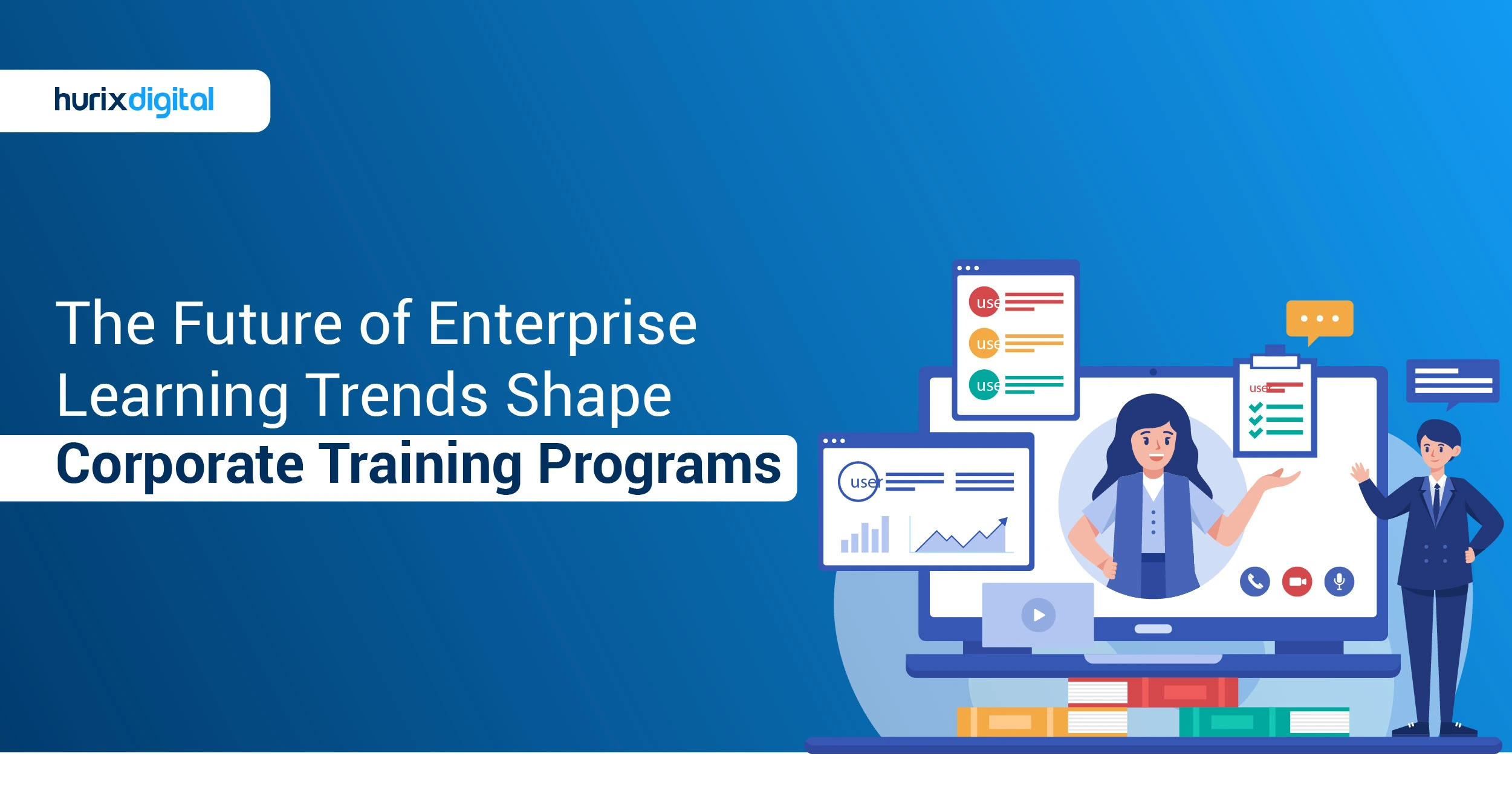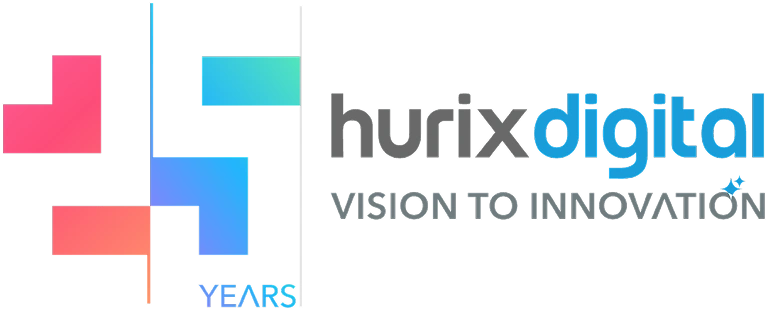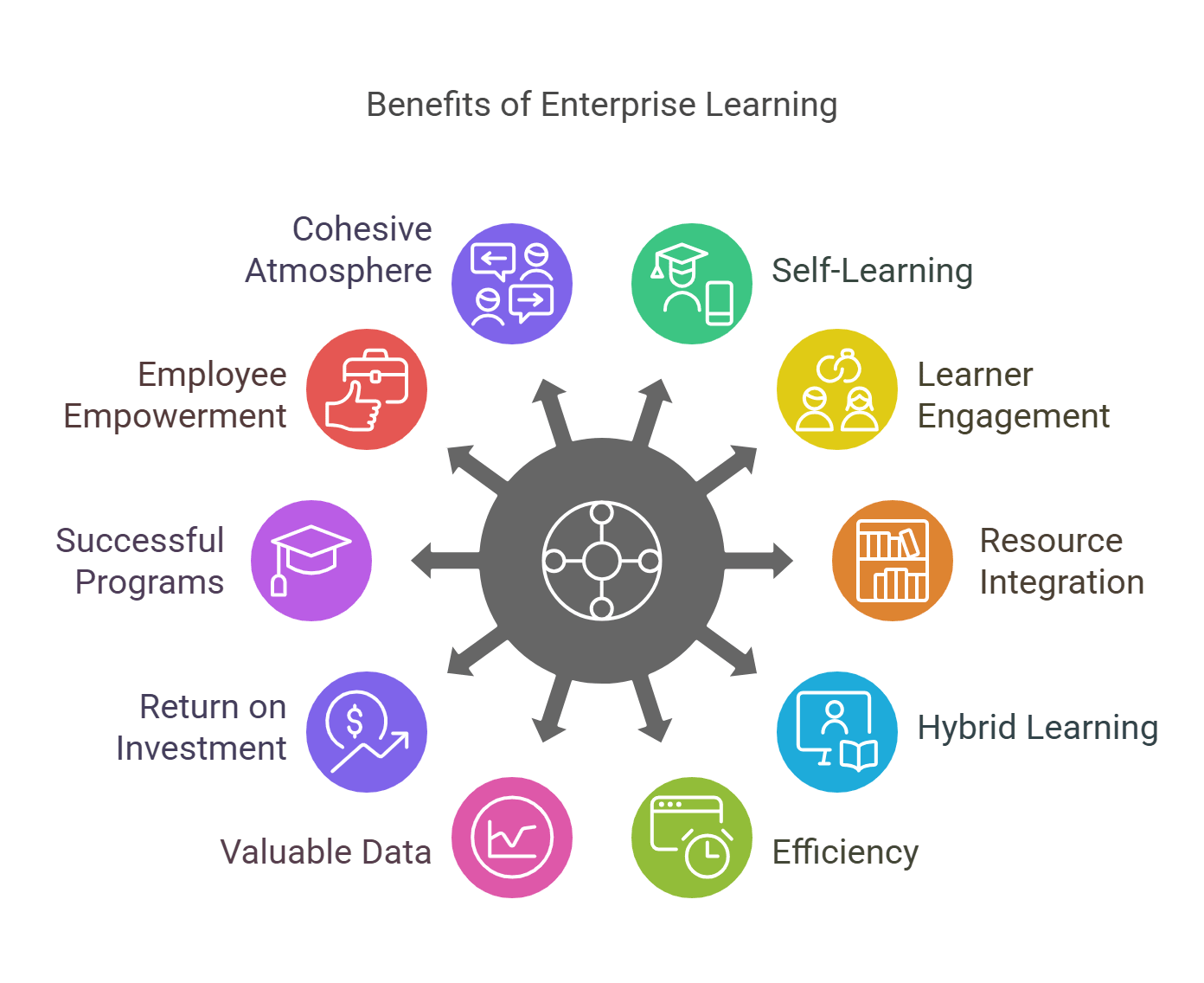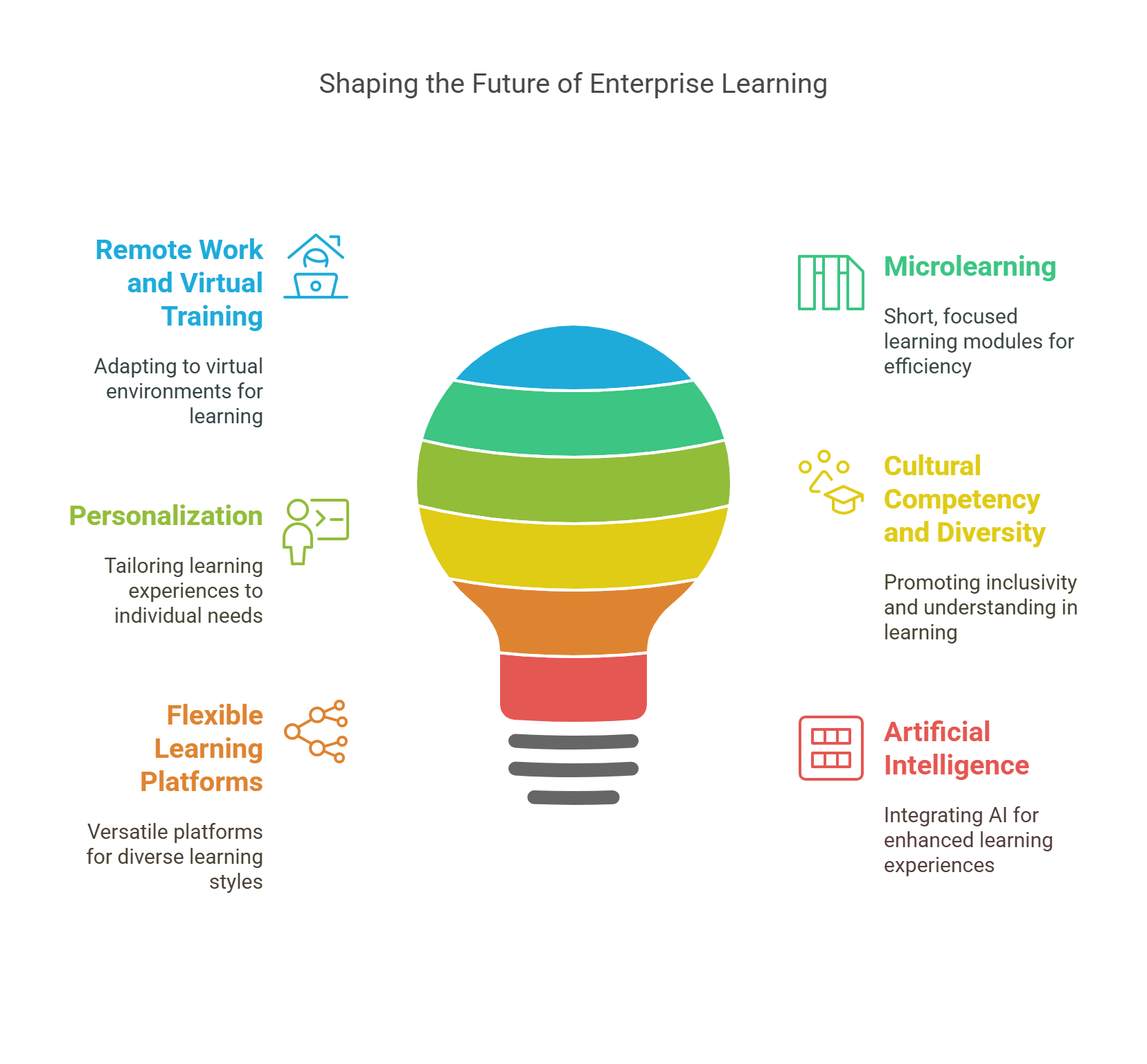
The Future of Enterprise Learning Trends Shape Corporate Training Programs
Summarize with:
Did you know that the eLearning industry has grown by 900% since 2000? This percentage is expected to triple by 2025.
With around 90% of organizations offering digital learning to their employees, corporate learning platforms are now essential to an organization’s success in the dynamic field of professional development.
These platforms become essential tools for organizations navigating the complexity of the modern workplace—not only for sharing knowledge but also for promoting a culture of continual learning.
Today, we dive into the newest developments, revealing how corporate learning platforms are transforming employee training, encouraging an adaptable culture, and acting as the foundation for a dynamic workforce prepared for the future.
Table of Contents:
- What is Enterprise Learning?
- Why is Enterprise Learning Important?
- 6 Future Trends in Enterprise Learning
- Understanding the Importance of the Science of Learning
- How to Use the Science of Learning in Corporate Learning Programs?
- Summing Up
What is Enterprise Learning?
Enterprise learning refers to principles and practices that allow employees, customers, and partners to access training, skills development, and other knowledge assets. It is a system that allows for continuous learning and development in an organization. Enterprise learning includes the people, processes, content, and technologies that enable your business to deliver training and optimize learning outcomes.
Content is rapidly changing in today’s digital world, and technology constantly evolves. Given this, it is all the more important to have access to new information, continuous learning, and opportunities for skills development. The best enterprise training companies can help your business stay competitive and meet industry standards.
Why is Enterprise Learning Important?
Enterprise learning is important for several reasons, which are given below:
1. Supports Self-Learning
An enterprise training program gives employees better control over training and development and allows them to play a more active role in the process. It allows employees and other members of an organization to access educational material independently.
An enterprise approach to workforce learning prevents a passive approach to learning. Companies can decentralize the training process with technology solutions such as eLearning platforms and individual learning tracks.
This encourages employees to become more motivated about learning and simultaneously reduces the burden of responsibility for managers.
2. Enables Better Learner Engagement
Enterprise learning connects learners to the training program and enables them to engage better with the learning resources. With constant access to educational materials, employees and other users can learn better and retain knowledge and skills through more participative learning.
3. Integrates Training Resources
Integrating all your training resources improves the learning experience and makes organizing more efficient. With multiple forms of content available, employees can access different ways of learning.
4. Enables Hybrid Learning
Enterprise training allows for hybrid learning for both in-person and remote employees. Blended learning leads to better employee engagement.
5. Better Efficiency
It leads to a more organized learning framework with learning resources available for different departments and customers. It also improves training, leading to better performance at work and improved efficiency.
6. Provides Valuable Data
Enterprise learning provides valuable data that you can rely on to assess your learning and training programs. This enables your organization to determine the efficacy of educational resources and their impact on specific departments. L&D professionals can gain insights from this and make changes to learning materials or course modules that are not performing effectively.
7. Return on Investment
Enterprise learning delivers a return on investment by leading to better employee performance. Improving skills and knowledge retention allows employees to translate learning into practice.
8. Creates Successful Training Programs
Enterprise learning allows you to create a clear plan that matches training requirements with the organization’s goals. Successful training programs allow for effective knowledge management. The program provides a channel for employees and customers to access knowledge and information.
These programs also allow other stakeholders, such as partners and customers, to stay informed and updated. Enterprise learning platforms also support collaboration and peer-to-peer learning.
9. Empower Employees
Enterprise training empowers employees to develop their skills and keep up with market trends. It allows companies to individualize employees’ learning processes based on their different requirements and promotes independent learning and engagement with colleagues.
10. Creates a Cohesive Learning Atmosphere
A fully-developed enterprise learning system allows organizations to create a well-functioning training atmosphere. This ties the different aspects of training together and connects the different dots. It gives employees and L&D professionals a coherent understanding of the full picture as well as the areas where the organization has scope for improving training.
6 Future Trends in Enterprise Learning
As organizations increasingly adapt, the demand for virtual training solutions is on the rise. This shift not only allows for flexible learning opportunities but also enables companies to leverage a diverse talent pool from around the globe.
1. Remote Work and Virtual Training
In addition to changing how we view the workplace, the popularity of remote work has also changed the nature of employee training.
With the advent of cutting-edge technologies, corporate learning platforms have become essential in this paradigm shift. These platforms bring in a new era of immersive and interactive learning experiences in addition to facilitating traditional training modules.
The geographical limitations that formerly hindered collaboration are no longer relevant in the virtual world. Corporate learning platforms provide electronic links between employees located on different continents. Because virtual training is real-time, it facilitates quick contact and helps the workforce feel like a worldwide community.
Furthermore, the flexibility these platforms offer is a boon for employees with diverse schedules and time zones. Whether it’s a live virtual session or an on-demand module, corporate learning platforms accommodate the varied needs of a globally dispersed workforce.
This ensures that every employee has access to the same level of training and professional development.
2. Microlearning
Microlearning stands as a beacon of innovation in employee education, ushering in a transformative shift from traditional training methodologies. These bite-sized learning modules are strategically designed to profoundly impact the workforce and align seamlessly with the demands of the modern attention span.
At the forefront of this microlearning revolution, corporate learning platforms recognize the value of targeted, concise content. These platforms accommodate the fast-paced, multitasking nature of the modern work environment by decomposing difficult subjects into easily understood informational tidbits.
What makes microlearning unique is how it is incorporated into the workplace’s regular schedule. Employees can participate in continuous learning without interfering with their jobs because these brief modules are simple to read during brief breaks or in between tasks.
The availability of microlearning materials encourages a culture of learning on the go and a mindset in which picking up new skills is considered a natural progression in one’s career.
3. Personalization
In the evolving professional development landscape, the shift towards personalized learning experiences marks a profound departure from the conventional one-size-fits-all training approach.
Corporate learning platforms are spearheading this transformative journey, harnessing the power of data-driven insights to craft tailored content that resonates with individual preferences and learning styles.
The cornerstone of this personalized approach lies in corporate learning platforms’ ability to analyze user behaviors and preferences. By tapping into the vast pool of data generated through employee interactions with the platform, these systems can discern individual strengths, weaknesses, and preferred learning modes.
One key advantage of personalized learning is heightened engagement. When training content aligns closely with an individual’s professional goals and interests, the intrinsic motivation to learn is significantly enhanced.
Corporate learning platforms leverage this personalized touch to create a learning environment that feels relevant and directly applicable to each employee’s role, fostering a sense of ownership over their professional development.
4. Cultural Competency and Diversity
Cultivating cultural competency and diversity in today’s globalized workplace is more important than ever. Corporate learning platforms stand out as leaders in fostering an inclusive atmosphere by combining programs that explore cultural awareness in-depth and beyond basic comprehension.
These platforms are essential in creating a workforce that values and recognizes diversity. By integrating modules specifically created to foster cultural competency, employees engage in a process of self-exploration and comprehension.
Through immersive experiences, individuals traverse settings that resemble actual life circumstances, cultivating empathy and reverence for varied viewpoints.
5. Flexible Learning Platforms
In the dynamic landscape of the modern workforce, the emphasis on flexibility has become a cornerstone of workplace culture.
Flexible learning platforms, as agile allies in this paradigm shift, understand the pivotal role they play in accommodating the diverse workstyles and schedules of today’s professionals.
Through seamless integration of technology, these platforms empower employees to access training materials with unparalleled convenience, fostering not only professional growth but also a healthy work-life balance.
The widespread use of mobile technology has brought about a new era of accessibility, and flexible learning platforms take advantage of this development.
Thanks to mobile apps that prioritize the user, learning is no longer restricted to desks at work. Workers are empowered to improve their abilities wherever they go, dismantling the constraints of conventional educational settings.
6. Artificial Intelligence
In the era of digital transformation, the integration of artificial intelligence (AI) into corporate learning platforms stands as a watershed moment, reshaping the landscape of professional development.
AI algorithms, equipped with the capability to analyze intricate patterns of user behavior, bring forth a new paradigm in learning recommendations, revolutionizing the efficiency and effectiveness of training.
The heart of this transformation lies in AI’s ability to decipher each individual’s unique learning journey. By scrutinizing user interactions with the platform, AI algorithms discern preferences, strengths, and areas for improvement.
This holistic understanding enables the creation of highly personalized learning paths tailored to each employee’s specific needs and goals.
The training content distribution process has been improved, which demonstrates the efficiency gains. Instead of having to comb through massive course catalogs, staff members get personalized recommendations that point them toward modules that would help them achieve their skill development goals.
This guarantees that learning has a purpose and is intimately related to each person’s career trajectory, in addition to saving time.
Understanding the Importance of the Science of Learning
The science of eLearning is important because it can help you create corporate learning programs that are:
1. Effective
By applying the science of learning, you can design corporate learning programs that effectively enhance employee performance and meet your learning goals.
You can also avoid learning obstacles and misconceptions, such as the belief in learning styles, the decay of memory over time, and the false sense of mastery.
2. Engaging
The science of learning can help you create corporate learning programs that capture and sustain the attention and interest of your learners. It can help you use techniques such as storytelling, gamification, and personalization to make your corporate learning programs more relevant, immersive, and enjoyable.
3. Impactful
Using the science of learning, you can create corporate learning programs that have a lasting impact on your learners and your organization. It can help you measure and evaluate the effectiveness of your corporate learning programs and ensure that they transfer to the workplace and support your business goals.
How to Use the Science of Learning in Corporate Learning Programs?
Below are the most effective ways to leverage the science of learning in your corporate training initiatives:
1. Make it Meaningful
One key aspect of the science of learning is that learning is more effective when it is meaningful and relevant to the learner. This means that you need to connect your corporate learning programs to your learners’ prior knowledge, goals, and interests.
Show them how your corporate learning programs can help them solve real-world problems and challenges that they face in their work.
Some of the ways to make your corporate learning programs more meaningful are:
- Use scenarios and case studies that reflect the realistic situations and contexts that your learners encounter in their work.
- Use examples and analogies that relate to the existing knowledge and experience of your learners.
- Use stories and narratives that engage the emotions and imagination of your learners.
- Use questions and prompts that elicit the curiosity and motivation of your learners.
- Use personalization and customization that allow your learners to choose their learning paths and preferences.
2. Make it Active
Make learning more effective by engaging your employees in the learning process and encouraging them to actively process, apply, and reflect on new information and skills. Provide them opportunities to practice and test their learning and receive feedback and guidance.
Here’s how to make your corporate learning programs more active:
- Use interactive elements such as quizzes, simulations, games, and puzzles that challenge and reinforce the learning of your learners.
- Use collaborative elements such as discussions, debates, peer reviews, and group projects to foster your learners’ social and cooperative learning.
- Use experiential elements such as role-plays, demonstrations, and field trips that provide hands-on and immersive learning for your learners.
- Use reflective elements such as journals, portfolios, and self-assessments to promote your learners’ metacognitive and self-regulated learning.
3. Make it Spaced
This means avoiding cramming and overloading your learners with too much information and skills at once. Provide them with repeated and varied exposure and review of the new information and skills over time.
Make your corporate learning programs more spaced using the following strategies:
- Use microlearning elements such as bite-sized modules, videos, podcasts, and infographics that deliver the essential information and skills in short and manageable chunks.
- Use spaced repetition elements such as flashcards, quizzes, and reminders that help your learners review and recall the new information and skills at optimal intervals.
- Use interleaving elements such as mixed practice, switching topics, and alternating formats that help your learners integrate and differentiate the new information and skills from different domains and sources.
4. Make it Varied
Expose your learners to different types of information and skills and different modes and methods of learning to make your learning program more interactive. Adapt your digital learning solutions to your learners’ different needs and preferences.
Some of the ways to make your corporate learning programs more varied are:
- Use multimodal elements such as text, audio, video, images, and animations that appeal to the different senses and learning styles of your learners.
- Offer your learners different learning formats and media through multiformat elements such as eBooks, webinars, podcasts, and blogs.
- Use adaptive elements such as branching scenarios, adaptive quizzes, and adaptive feedback that provide different levels and paths of learning for your learners.
5. Make it Feedback-Rich
Make the science of learning feedback-rich and supportive. To do this, provide your learners with timely, specific, and constructive feedback and guidance on their learning progress and performance. Encourage them to seek and use feedback and support from various sources and resources.
Here’s how you can make your corporate learning programs more feedback-rich:
- Use formative elements such as quizzes, surveys, and polls that provide your learners with immediate and actionable feedback and suggestions on their learning.
- Use summative elements such as tests, assignments, and projects that provide your learners with comprehensive and evaluative feedback and grades on their learning.
- Use social elements such as mentors, coaches, peers, and experts that provide your learners with human and personalized feedback and support on their learning.
Summing Up
Enterprise training plays a critical role today, where technology constantly evolves, and industry requirements rapidly change. It is important for several reasons: supporting self-learning, enabling better learner engagement, integrating training resources, and more.
Some best practices for enterprise learning include keeping training programs flexible, making learning easy to access, and emphasizing data collection.
Hurix Digital offers eLearning solutions for enterprises and workplaces. We can help you create educational content with a customized design and engaging visuals. From devising a plan from scratch to delivering a learning strategy, Hurix Digital creates digital solutions for diverse enterprise requirements.
So what are you waiting for? Contact us today to revolutionize your corporate learning experience!
Summarize with:

Senior Vice President
Julia brings over 20 years of global experience in digital learning and business strategy. She specializes in client success, enterprise learning solutions, and driving growth through innovation, with a focus on AI, VR, and emerging technologies across diverse industry verticals.
 A Space for Thoughtful
A Space for Thoughtful 






